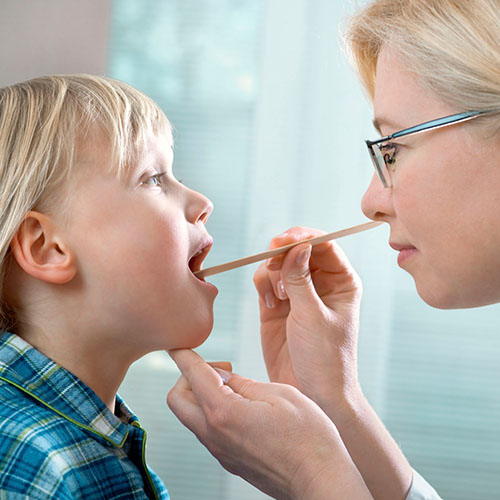What is a sore throat?
A sore throat is one of the most common conditions seen by a family General Practitioner (GP). People use the term to describe almost any feeling in the throat, from dryness to acute pain. In severe cases this may led to difficulty in swallowing solids, liquids and occasionally saliva.
About 70% of all sore throat cases are due to viral infection rather than bacterial infection. Symptoms of sore throats vary in children and adults.
Sore Throat in Adults
Acute Viral Sore ThroatThis is an infection of the upper respiratory tract. Viral sore throats are more common during the winter and usually settle after a few days. Symptoms may include:
- · Runny nose
- · Sneezing
- · Hoarseness
- · Dry cough, due to chest infection
- · Dullness of hearing
- · Redness of the pharynx, tonsils and roof of the mouth (soft palate)
Treatment
Self-Care by the individual
Generally the sore throat will clear up on its own. To ease the discomfort it is recommended to:
- · Use saline gargles
- · Take common painkillers e.g. paracetamols, aspirins or ibuprofen
- · Drink plenty of fluids
- · Take honey and lemon mixtures
If symptoms persist or are recurring people should go see their GP. A swab of the throat might be taken to identify the cause of the sore throat. If the results show a bacterial infection, a course of antibiotics is usually prescribed. The antibiotic normally prescribed is Penicillin. Patients allergic to Penicillin are given an alternative antibiotic such as Erythromycin.
Quinsy (Peritonsillar Abscess)This condition usually occurs following the spread of a tonsil infection. Pus builds up causing an abscess or ‘Quinsy' to develop. Symptoms include:
- · Acute sore throat
- · Inability to swallow saliva resulting in dribbling
- · Swelling in the neck (caused by the abscess spreading to the roof of the mouth (soft palate)
Treatment
An early abscess or Quinsy is treated by antibiotics, namely Penicillin.
A fully developed abscess requires hospital admission where antibiotics are given through a drip (intravenously). It may also be necessary to drain the pus. This is done by making a small incision under local anaesthetic.
Sore Throats in Children
Young children are the group of people that suffer most frequently from sore throats.
Viral InfectionsThe majority of sore throats in children are caused by viruses. Children with a sore throat due to a viral infection may also have a runny nose and/or a cough.
Treatment
The sore throat will clear up on its own. To ease the discomfort the following is recommended:
- · Take common painkillers (paracetamol, aspirin or ibuprofen)
- · Drink plenty of fluids
- · Have plenty of bed rest
This condition is more frequently seen in teenagers and young adults. It is caused by the ‘Epstein-Barr' virus. It is thought that the virus is spread through saliva and is jokingly referred to as the ‘Kissing disease'. Symptoms can include:
- · Severe sore throat
- · Constantly feeling unwell, tired and feverish
- · Enlarged tonsils, sometimes covered by a white membrane
- · Swelling of the lymph nodes (lymphadenopathy)
- · Appearance of a faint red rash on the limbs
A blood test is required to diagnose Glandular Fever.
Treatment
Glandular Fever will clear up on its own although it may be some time before the person feels completely well again. To help ease the symptoms, it is recommended to:
- · Take painkillers (e.g. paracetamol, aspirin or ibuprofen)
- · Drink plenty of fluids
- · Have prolonged bed rest
By C. Milford, Radcliffe Infirmary, Oxford and S. Anuku
Disclaimer
The details in this section are for general information only. Always check with your own doctor.


